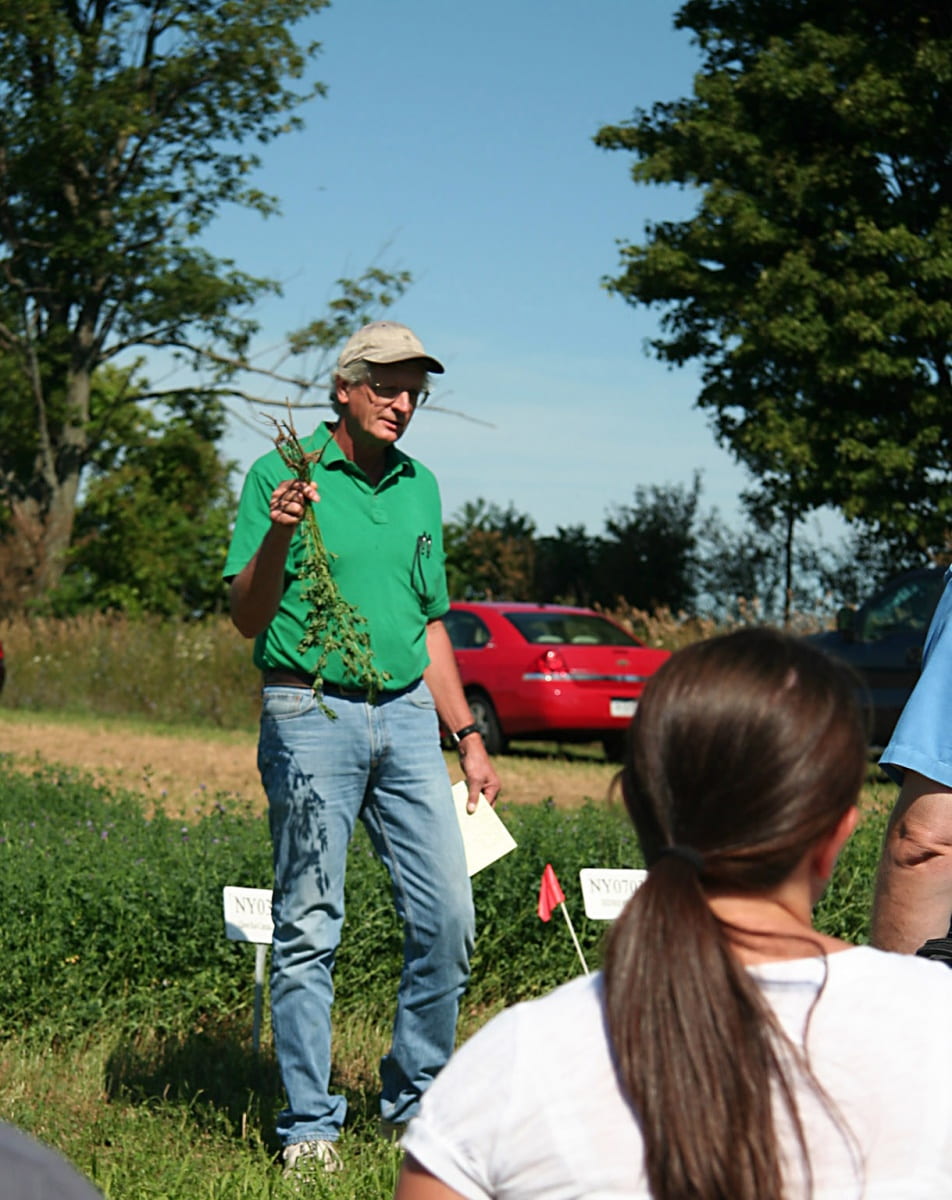Press Release by Mariah Courtney Mottley. Media contact: Jaime Cummings
Elson Shields, a Cornell entomology professor, received an Excellence in Integrated Pest Management (IPM) Award from the New York State Integrated Pest Management Program (NYSIPM) at Cornell University’s Aurora Farm Field Day on the Musgrave Research Farm. NYSIPM develops sustainable ways to manage pests and helps people to use methods that minimize environmental, health and economic risks. The award honors individuals who encourage the adoption of IPM in their businesses, schools, communities, and farms, and who develop new tools and tactics for sharing these practices.

Elson Shields, right, and Charles Bornt, left, Extension Vegetable Specialist with the Cornell Cooperative Extension Eastern New York Commercial Horticulture team. Elson is explaining the process of EPN application for a biocontrol project to suppress wireworms in the field. Photo: T. Rusinek.
The alfalfa snout beetle, an invasive pest, is a perennial threat to north country alfalfa. In the absence of any registered insecticides for this pest, growers are forced to only use cultural and biological controls. Shields found success protecting alfalfa from the snout beetle with the use of native entomopathogenic nematodes (EPNs). Nematodes are tiny worms that parasitize and eventually kill the beetle larvae, and stay in the soil to infect future generations of the pest. Shields pioneered the use of nematodes that persist in the soil, and has been able to control snout beetles as long as six years after a single application of EPNs.
Shields has taught growers to rear the EPNs and to apply them to their own crops. Dr. Shields is also exploring ways to use these beneficial nematodes to protect specialty crops. He works with agribusiness consultants in the private sector and other researchers in the public sector. His effective strategy with persistent EPNs has been featured in trade journals such as Growing Produce, Good Fruit Grower and Dairy Herd Management. He received an Entomological Foundation Award for Excellence in IPM in 2013, and his promotion of persistent EPNs is being widely adopted.

By studying the persistence of nematodes applied to alfalfa through a crop rotation that included several years of corn, Shields observed that EPNs were also helping to control the corn rootworm, on their vacation time from alfalfa. Through collaborations with horticultural researchers, Shields is working on applying persistent EPNs as biological controls in crops such as strawberry, cranberry, sweet potato and turf. He is also studying the potential for using these techniques on greenhouse ornamentals.
Margaret Smith, Professor of Plant Breeding and Genetics at Cornell University, commends Shields’ willingness to question standard pest management orthodoxy and to follow research results wherever they might lead. She continues, “Elson’s snout beetle IPM effort is an exemplar of an outstanding public sector pest management program. Shields has done pioneering, innovating, and broadly effective research on an array of crops. His record of success will be hard to match.”
Laura McDermott, Regional Extension Specialist, says: “Dr. Shields’ work with native entomopathogenic nematodes is some of the most exciting applied research I’ve been involved with in my 30-year extension career. This integration of a biological control method as a way to manage difficult soil-borne insect pests is inexpensive, effective, and truly sustainable. Elson ALWAYS has the growers in the forefront of his mind. His efforts to teach farmers how to raise and apply these nematodes is testimony to his understanding of their abilities.”
“New York Agriculture, including the dairy, vegetable and fruit industries, have benefitted greatly from Elson’s vision and willingness to go above and beyond what is expected,” says Teresa Rusinek, Extension Associate for Vegetable Production in Cornell Cooperative Extension of Ulster County. She continues, “I’ve observed at our field meetings and farm demo work that growers easily understand the system and readily adopt the biocontrol strategies Elson’s developed.”